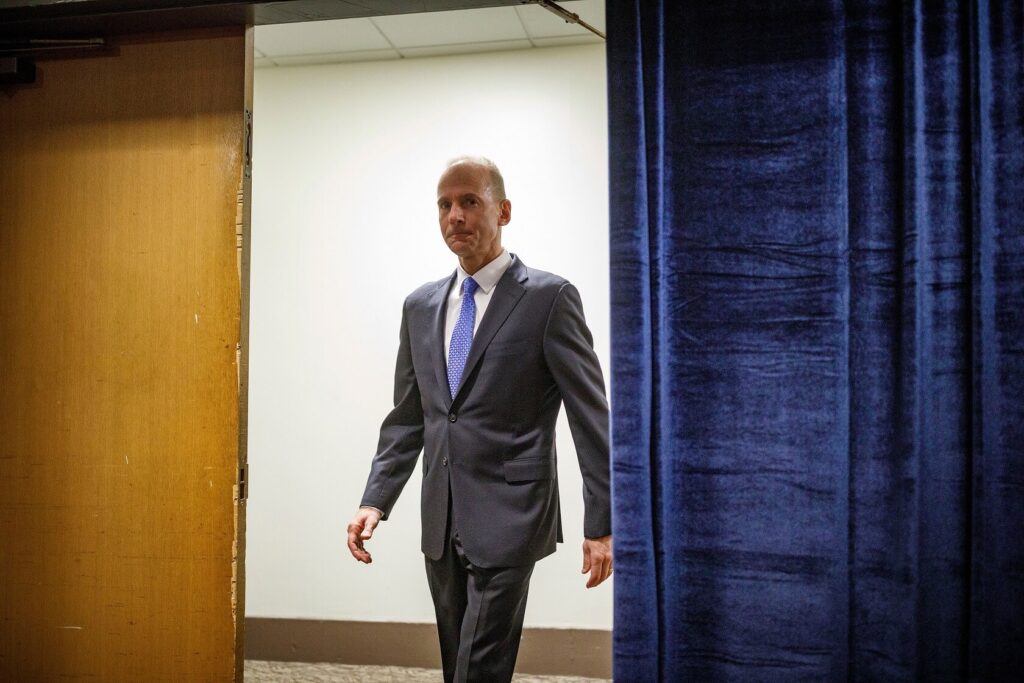Dennis Muilenburg, Boeing CEO, finished the month of October by taking two-day long swim in hot water. During two separate committee hearings, Muilenburg tried to convince the U.S. senators that Boeing is not a company, which puts profit before safety. However, recurring topics of ex-employee’s concern about MCAS and relation with the Federal Aviation Administration proved the task difficult.
Boeing President and Chief Executive Officer Dennis Muilenburg, together with Boeing Commercial Airplanes Vice President and Chief Engineer John Hamilton, appeared in two hearings on October 29 and 30, 2019. The duo testified before the U.S. Senate Committee on Commerce, Science and Transportation on the first day and then before the U.S. House Committee on Transportation and Infrastructure the following day. During approximately eight hours of hearings, the U.S. lawmakers questioned Muilenburg and Hamilton on a range of topics, from technical aspects of the 737 MAX, its certification process, to personal accountability, outreach to victims’ families and so on. However, two aspects appear to be central – the alleged serious shortcomings in Boeing company culture (“putting profit before safety”) and Boeing-FAA relation, which, as now suspected, might have leaned too much on the “coziness” side.
Boeing, the FAA and delegation process: is the relationship truly “professional‘?
One important aspect of the hearings was the delegate authority process. The process is now under fire, as the FAA used in while validating the Boeing 737 MAX airworthiness. The aircraft obtained FAA’s clearance to enter service in March 2017.
“We believe that delegate authority process that we have today has contributed to improve safety over the last two decades,” Muilenburg told senators during the first hearing. “We are open to improving it, but the idea that we can tap the deep technical expertise from companies across the aerospace industry is a valuable part of this certification process. But the FAA is the certification authority and should be, and should continue to be”. However, at another instance the CEO also sad that he supported taking a ”hard look” at the delegation process.
Several senators have suggested that Boeing is too “cozy” with the regulator that oversees certification of its products ‒ a claim Muilenburg denied multiple times, arguing that they have a great deal of respect for the FAA instead.
Boeing safety culture: in ex-employee’s emails or Muilenburg’s statements?
Yet the respect, or lack of it, for the FAA was also questioned in the light of another sub-topic, which received a lot of attention. Members of both committees questioned emails and messages of (now ex-) 737 Chief Technical Pilot’s emails and messages from 2016.
In an email, dated March 2016, he writes: “I confirmed with the Flight Controls engineers that MCAS does live in both FCCs [flight control computers], and only needs one to function. So given that, are you ok with us removing all reference to MCAS from the FCOM and the training as we discussed, as It’s completely transparent to the flight crew and only operates WAY outside of the normal operating envelope?”
Even more critique was addressed to text exchange between 737 Chief Technical Pilot and another Boeing employee. In the exchange, the pilot describes his experience of MCAS activation using phrases like “I’m levelling off at like 4000ft, 230 knot and the plane is trimming itself like crazy”, the MCAS is “running rampant on me”, “this was egregious”, “why are we just now hearing about this?” and “so I basically lied to the regulators (unknowingly)”.
“We are not quite sure what [the pilot in question] meant by that exchange,” Muilenburg commented. “His lawyer has suggested that he was talking about a simulator that was in development at that time period. That is where he was working. That could be the case, we don’t know. I fully support diving deep into this and understanding what he said and what he meant […]”.
On another instance, while commenting that the pilot used a term “Jedi mind tricking” talking about foreign regulators and the 737 MAX certification in foreign countries, Muilenburg reinstates not knowing what the pilot meant, but claims: “that just not represent the people of Boeing, it does not represent our people who work with international regulators”.
The description of “people of Boeing” can be found in multiple company’s communications, including Muilenburg’s opening statements in both hearings. “There are over 150,000 dedicated men and women working for Boeing around the world—and their commitment to our values, including safety, quality, and integrity, is unparalleled and resolute. No matter what, we will stay true to those values because we know our work demands the utmost excellence,” the opening statement proclaims.

